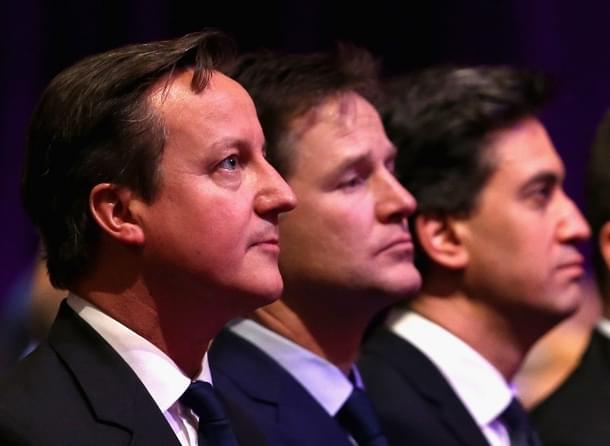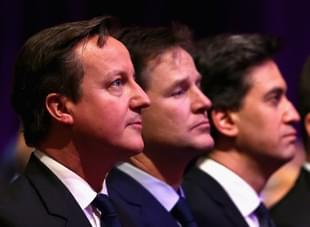World
Tories? Labour? Lib-Dems? Or Who ?
Gautam Sen
Apr 30, 2015, 07:49 PM | Updated Feb 18, 2016, 12:30 PM IST
Save & read from anywhere!
Bookmark stories for easy access on any device or the Swarajya app.


In a weeks time, a new government will be elected in Britain. What are the economic, political and international factors that will count?
In just over a week a new government will be elected in Britain. The imponderable question is who will become Prime Minister and which inevitable coalition partner will join the ruling party. The bookies favourite has been the Labour Party’s Ed Miliband, but popular support has shifted somewhat in favour of the Conservatives in recent days. Voters in English regions are being warned of the dire consequences for them and taxation policy, in particular, if Labour depends on the Scottish National Party (SNP) to govern. The SNP is expected to demand its pound of flesh in the shape of subsidies that taxes on the rest of the UK will have to fund. Yet leaders of the three major political parties convey a sense of being led by identikit politicians, created synthetically by professional party managers as near substitutes that reflect an unhealthy juncture of societal gridlock.
In reality, the room for manoeuvre of any incoming government will be limited by severe fiscal constraints, worsening by the day as new growth figures indicate a sharp economic slowdown. In any case, Britain’s national debt has continued to spiral because tax revenues have fallen, since the 2008 crash, as the incumbent Conservative government struggled to reduce the budget deficit.
Both Conservatives and Labour have been serenading the electorate with promises of policies to benefit key voting constituencies. The Conservatives have just made an unprecedented commitment to legislate that direct and indirect taxes will not rise during the entire term of the next parliament. The Labour party has promised to sponsor a major building programme to combat rising house prices and a shortage in supplies. It is also promising rent controls, guaranteed to bring chaos to the private rented market. It all indicates how keenly the election result is poised. But many policy pronouncements of political parties range from the vague to the incredible, often wildly optimistic in their purport!
The Labour leader, Ed Miliband, was initially viewed as unelectable owing to supposed personality traits, but that perception appears to have receded after his performance in televised election debates was judged credible. The victor in them though was the feisty leader of the SNP, who was articulate and emphatic even though the policies espoused by the party are condemned by observers as unaffordable. But she is only addressing Scottish voters who are canny enough to know that Nicola Sturgeon’s promises of higher spending on welfare in Scotland will depend on holding the balance of power in Westminster, the national parliament.
The Green Party and its improbable leader are a marginal presence and unlikely to win any parliamentary seats and can make promises of massive rises in taxation to fund a spending spree on welfare. Clearly, desperation intended to appeal to the desperate and nothing to do with sustaining a green planet. Like other parties, it has made no serious attempt to compute the cost of election promises.

The Liberal Democrats (Lib-Dems), the product of an earlier merger between defecting Labour Centrists and the old Liberal Party are evidently appealing to a more sombre middle path, between the alleged Punch and Judy show of Labour and Conservative. However, their policies are not fundamentally different, though they are suggesting somewhat greater fiscal stringency than Labour that will nevertheless rein in welfare cuts to more tolerable levels than Conservative proposals will. Though being in government, as coalition partner of the Conservatives, has harmed its reputation among committed supporters, like students. They feel betrayed that Lib-Dem promises of lower student fees were abandoned with alacrity during the last parliament, while they shared power with David Cameron’s Conservative party, occupying ministerial office and the trappings of power with relish. The Lib-Dems are poised to lose a number of seats on this occasion and will be lucky to play kingmaker after May 7.
A newer political phenomenon is the United Kingdom Independence Party (UKIP) which espouses a diminishing English nationalism as opposed to European Union membership. Its main policy plank is determined opposition to the United Kingdom becoming integrated further into the European project, with the European Union bureaucracy exercising significant authority over issues large and small. There are plenty of instances to which the UKIP can point as absurd examples of detailed legislative obligations emanating from the EU. And it appeals to a genuine sense of grievance that numbers of highly unsavoury criminals of foreign origin have managed to use European human rights guarantees to evade deportation from the United Kingdom. But the most controversial issue that has galvanised support for it is the unrestricted right of abode in the UK enjoyed by citizens of poorer new members of the European Union, on equal terms with the local population.
The UKIP seems unlikely to win any parliamentary seats, according to most pollsters. Yet they may take away enough votes from disgruntled anti-EU Conservative voters and help the Labour Party in the bargain. The latter, like the Lib-Dems, is unequivocally committed to European Union membership unlike the Conservatives, who promise to re-negotiate key aspects of treaty commitments signed by previous governments. Indeed the Conservatives are promising a vote on EU membership itself, much to the alarm of its traditional business supporters.
The sleight-of-hand of major British political parties has come back to haunt them since they knew what they were letting the country in for, but underestimated the depth of the socio-economic impact and reaction of the British people. Oddly, people of Indian origin in the UK, themselves immigrants of an earlier era, are most vehemently opposed to the unrestricted right to entry enjoyed by people from new European Union members.
Leaving the European Union is not really an option, but opponents of closer integration have always existed in the Conservative Party. To this maybe added many more dismayed at the large numbers of Eastern Europeans arriving in the UK, first from the former Czechoslovakia and then from Poland, Romania, etc. There seems to be a paradoxical mismatch between vacancies for work in cities like London and the willingness and availability of locals to offer themselves for employment. These jobs are being taken up by newly arrived immigrants from countries like Poland, who seem to constitute a high proportion in construction and increasingly across the service sector. But they surely depress wages for locals. Yet this was exactly what British politicians had anticipated in their quest to make Britain a more attractive location for investors. However, EU membership is a critical factor in this calculus because it provides automatic access to the large European Union market for foreign investors who might otherwise be tempted to relocate.
Britain’s elections are occurring in a situation of uncertainty and change, which causes serious economic anxiety and has depressed living standards for many. The incompetence of the Labour Party while in government before 2009 that compounded the global financial chaos appears to have been forgotten somewhat. Its role, though with wide parliamentary support, involving the country in expensive foreign wars, without much to show for it, has also contributed to an underlying sense of national drift. It has created the threat of Islamic terrorism against domestic British targets and contributed to considerable tension and disquiet. Britain’s precious National Health Service, too, is labouring under severe strain and its school system and national infrastructure are also in parlous condition, while large sums are being devoted to fruitless foreign adventure.
British-Asians of Indian origin are dismayed too that parliament has sought to impose anti-caste legislation on them without any proof that it is an issue in British life to justify a punishable offence being legislated. And the Labour Party, hugely dependent on votes of people of Pakistani origin, is ominously committed to supporting the ‘wishes of the people of Kashmir’ to determine their own future, appearing to suggest the issue of sovereignty is not closed.
The new government of May 2015 will find itself besieged on many sides, with a continuing financial crisis and the need to find welfare and other financial cutbacks that will hurt the disadvantaged. Political deception and financial jugglery are likely to be the order of the day. But the gods forbid a wider global financial crisis that derails even the modest level at which the economy is functioning at present. Britannia that once ruled the world no longer has the vast resources of its jewel in the crown, which underwrote economic setback at home. But India is viewed as one possible future stimulus of opportunity for a country unable to recover from economic setback and crisis of management that has brought it to a historic turning point. A fractured electoral verdict, with no clear sustainable governing coalition, may lead to fresh polls within a short of span of time. Such an outcome will do no favours to an economy already in difficulty, but a Labour-SNP government seems likeliest, with the latter sweeping Scotland completely, even if the Conservatives win the largest number of seats.
Dr. Gautam Sen is President, World Association of Hindu Academicians and Co-director of the Dharmic Ideas and Policy Foundation. He taught international political economy at the London School of Economics and Political Science for over two decades.





